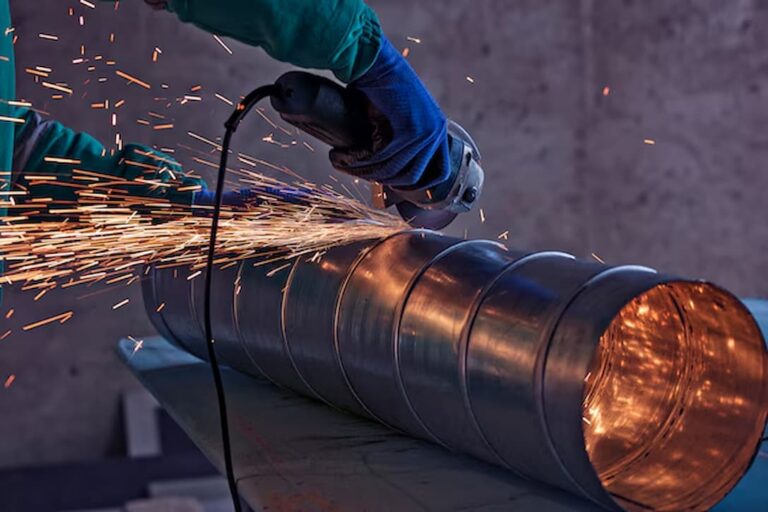Metal fabrication is the process of shaping raw metal into valuable products. From buildings to vehicles, it plays a crucial role in modern life. Learn about its types, benefits, and how metal fabrication Norwich supports industries with high-quality metalwork. Find out how this process shapes the future with new technologies and innovations.
Metal is everywhere. From cars and bridges to kitchen appliances, metal plays a vital role in our daily lives. But have you ever wondered how raw metal turns into valuable products? That’s where metal fabrication comes in.
Metal fabrication involves shaping, cutting, and assembling metal into finished products. It is used in construction, manufacturing, and even art. This process requires skill, precision, and the right tools. This article will explore metal fabrication, its types, and why it matters.
Understanding Metal Fabrication
Metal fabrication is the process of turning raw metal into a finished product. It involves different techniques like cutting, bending, and welding. Skilled workers use tools and machines to shape metal into valuable structures.
This process is vital in many industries. Factories, construction sites, and automobile companies rely on metal fabrication. Without it, we wouldn’t have strong buildings, durable vehicles, or sturdy household items.
Types of Metal Fabrication
Metal fabrication is not a single process. It includes different methods depending on the final product. Here are some common types:
- Cutting
Cutting is the first step in metal fabrication. It involves slicing metal sheets or bars into smaller pieces. This can be done using saws, lasers, or water jets.
- Bending
After cutting, metal often needs to be bent into shape. Machines apply pressure to form the desired angle or curve. This is essential for making pipes, frames, and enclosures.
- Welding
Welding joins two pieces of metal together. Heat melts the metal, allowing it to fuse. This technique is used in car manufacturing, shipbuilding, and structural work.
- Assembling
Once the metal parts are cut, bent, and welded, they need to be put together. This is the final step before the product is ready for use.
Why Is Metal Fabrication Important?
Metal fabrication plays a crucial role in everyday life. Here’s why it matters:
- Construction – Buildings, bridges, and roads all rely on strong metal structures.
- Automobile Industry – Cars, trucks, and trains use fabricated metal parts.
- Manufacturing – Factories need metal frames, machinery, and tools.
- Household Items – Appliances, furniture, and decorations often include metal components.
Without metal fabrication, modern infrastructure and technology wouldn’t exist.
The Process of Metal Fabrication
Each metal fabrication project goes through several steps. Here’s how it works:
- Designing
Engineers create a design using specialised software. This ensures accuracy before production starts.
- Material Selection
Different metals are chosen based on the product’s use. Common options include steel, aluminium, and copper.
- Cutting and Shaping
Metal is cut, bent, or formed into the required shape using machines.
- Assembly and Finishing
The final product is assembled, polished, and coated to improve durability.
Metal Fabrication in Norwich
Many businesses and industries rely on metal fabrication Norwich for high-quality metalwork. From small workshops to large factories, skilled professionals provide custom fabrication services.
This industry supports local construction, manufacturing, and engineering. Whether it’s metal frames for buildings or precision-cut parts for machines, Norwich has a strong metal fabrication sector.
Industries That Use Metal Fabrication
Many industries benefit from metal fabrication. Some of the most common include:
- Construction
Steel beams, staircases, and roofing materials are all fabricated metal products.
- Transportation
Cars, planes, and trains need strong and lightweight metal parts.
- Manufacturing
Factories use fabricated metal for machines, storage, and tools.
- Energy Sector
Wind turbines, solar panels, and pipelines require metal fabrication.
- Agriculture
Farming equipment like tractors and irrigation systems use metal parts.
Metal fabrication is essential in nearly every industry.
Benefits of Metal Fabrication
Fabricated metal products offer several advantages, including:
- Durability – Metal lasts longer than plastic or wood.
- Strength – It can withstand high pressure and extreme conditions.
- Customization – Metal can be shaped into various forms.
- Recyclability – Many metals can be reused, reducing waste.
Because of these benefits, metal fabrication is a preferred choice in many industries.
Modern Innovations in Metal Fabrication
Technology is making metal fabrication faster and more precise. Some modern innovations include:
- Laser Cutting – A high-precision method that reduces waste.
- 3D Metal Printing – Allows for complex shapes and faster production.
- Automated Welding – Improves speed and consistency in manufacturing.
- Eco-Friendly Coatings – Reduce environmental impact and increase durability.
These advancements are improving efficiency and sustainability in metal fabrication.
How to Choose the Right Metal Fabrication Service
If you need metal fabrication, choosing the right service is important. Consider these factors:
- Experience – Look for skilled professionals with years of experience.
- Equipment – Advanced tools ensure better precision and quality.
- Customisation – A good fabricator should meet your specific needs.
- Cost – Compare prices to find a service within your budget.
Whether you need metal parts for construction or machinery, selecting a reliable fabricator is key.
Metal Fabrication Norwich: A Thriving Industry
The metal fabrication Norwich industry continues to grow. Local businesses provide high-quality metalwork for various sectors, from construction to engineering.
With skilled workers and advanced machinery, Norwich remains a hub for precision metal fabrication. If you need durable and custom metal solutions, Norwich has plenty of options to explore.
Conclusion
Metal fabrication is an essential process that shapes our world. It involves cutting, bending, welding, and assembling metal into valuable products. This process is vital for industries like construction, transportation, and manufacturing.
Metal fabrication plays a key role in modern infrastructure, from small workshops to large factories. It provides strength, durability, and sustainability. As technology advances, metal fabrication will continue to evolve, making it even more efficient and eco-friendly. Whether you’re in Norwich or anywhere else, quality metalwork is crucial for building a better future.
